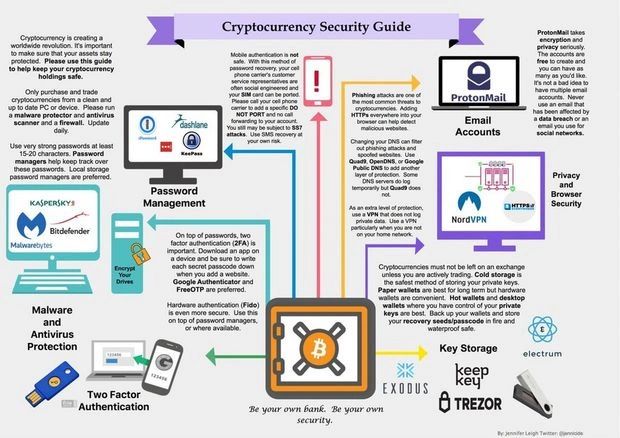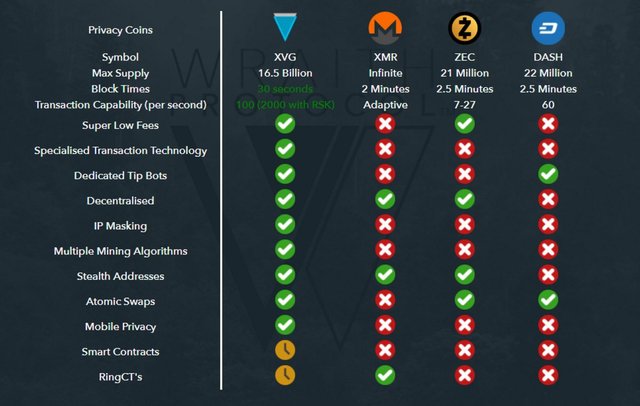
Post by: @CryptoLanger
Hey Guys. Here is an overview on the ways you can keep you and your money safe on the web.
As Cryptocurrencies become more mainstream its attracting many scams and hackers to prey on people who aren't properly protected online. Here's how to keep your personal information and your money safe.
https://www.ledgerwallet.com/products/ledger-nano-s Is the Hardware Wallet I use. It have over 15 compatible coins on it that you can safely store offline in cold storage. (see their site for the coins they are compatible with).
Now unfortunately these ledgers don’t carry the majority of coins so this isn’t practical for all coins. You can however carry ALL ER20 tokens. (ER20 tokens are any tokens made using the Ethereum Platform). You can link up your Ethereum Wallet to your Ledger Nano S. This requires you to physically use your Ledger Nano S to gain access to the funds on your Ethereum Wallets. A Great security to prevent hacking. Here is a video on how to link your Ethereum Wallet to your Ledger Nano S.
Remember when buying this don't buy a used one off Amazon. Buy straight from the company to prevent any possibility of tampering. If you aren't the one manually typing out the 24 character key phrases then its been tampered with!
The next best way to be safe is to protect your private keys. (If You don't know what a private key is; see Terminology blog post). Don’t take screen shots, don’t take pictures etc. Print them or write them on paper and keep them stored safely. Not on the internet, not on the iCloud, not on your laptop. These are hack-able. Think of a Wallet like a Key Chain. If somebody steals your keys they have access to your car. Keep your keys safe.
Next thing is to back up all exchanges and your email address with Google Authenticator (2FA). This generates a secret six digit password to your phone every 15 seconds so even if someone stole your password and username on an exchange they also have to get onto your phone, open up your Google Authenticator App and input the six digit code that pops up within that 15 seconds. This is a trusted, Google application. This should be used everywhere you need to keep information safe and private. You find the Google Authenticator App in the Mobile App Store.
Do your due diligence on identifying what are fraudulent sites and scams. Personally, I don’t go on sites unless I read comments on Reddit first. Typically, your safe to go on the coins actual site because if it was fraudulent, on the same google search page it should have Reddit articles of people saying it’s a scam. So just be safe, use recognized sites as often as possible, and when in doubt; read on reddit first.
Only Trade cryptocurrency on laptops that are clean and that run malware protection (I recommend Malwarebytes), antivirus scanner (I recommend Norton Antivirus), and a Password Manager (if you choose Norton it comes with an Identity safe that allows you to safely store passwords. Keep these updated daily.
Use strong passwords (15-20 characters) and keep your passwords different on each exchange. (Keep a record of passwords along with copies of private keys kept in a Fireproof/waterproof safe along with your hardware wallet and any other important secure information such as an External Hard Drive of your computer backed up). Don't use repeat passwords and change them every so often. This is why features like Identity Safe's or LastPass password managers work so well because It's impossible to memorize 30+ different username and password combinations. Aside from these tools never write your password list on your computer or print it. Always hand written and kept in a safe. People can easily hack your computer and hack your wifi printer and see what you've printed.
Proton Mail is a free email account that you can make that allows privacy and encryption. Ideally keep emails you use on exchanges different from ones you use on social media.
You can buy a VPN (NordVPN is very user friendly with a great interface and is under $4 a month) in order to keep your IP address Private if your concerned about privacy and spying. Most VPN's you have to pay for but you can use Opera Browser which gives you a free option to use a VPN. It works well and it is free. However you get more protection in a paid NordVPN than Opera VPN free.
Use Browsers like Firefox instead of Internet Explorer and use search engines like DuckDuckGo (or Norton Search if you use Norton) to keep searches private. Make sure you at HTTPS:// into your browser on all sites to prevent malicious phishing scam sites.
Another tip I recommend is to watch @ThioJoe on Youtube as he is a guru at safety and technology! He mentioned in a video to make sure your laptop account is logged in on a standard account rather than an administration account (as a standard account gives less access to your PC than that of an administration account (if an app were to ever compromise your PC).
Between these features and doing your own due diligence you should be safe from 99.9% of hacks. Just constantly check that if you go on Myetherwallet Website, just double check that it is truly Myetherwallet by looking at the HTTPS:// address and that you didn’t click on a phishing site that looks identical to Myetherwallet.
One important thing to on scams in Crypto. Initial Coin offerings are very enticing but there are so many out there that are fraudulent. Just make sure you do lots of research before sending your coins to ICO’s. Make sure the companies are active on Twitter etc, make their management team public, etc. Or else you’ll be sending them Ethereum and waiting for them to Air Drop that ICO in your MyEtherWallet Account and months later realize it was a scam ICO. There have been ICO's that will say certain famous or reputable people are on the panel or make up some fictitious people and say they are the CEO or on the team. This is often hard to identify if its a scam or not. So unless you are positive and watch these guys on video and you can trust it's legit I just wouldn't risk it. But thats my opinion only!
One other thing. Keep long term holds in a wallet rather than an exchange. Exchanges are susceptible to hacks. When your money is on an exchange its not in your hands it's in the exchanges hands. Keep this in mind. Keep your money on it as you trade coins (its impractical to send money back and forth daily between the wallet and exchange) but just make sure your not storing funds long term on an exchange. Or if you are; atleast spread between a few exchanges so you limit your hit if one of the exchanges were to go under.
Lastly, if you are big into Privacy coins then look into coins such as Verge:

Thanks for reading guys. Any further questions, comment below or shoot a message to the Discord Community Group and myself or others will gladly be able to help!
Other things I didn't touch base on but are good to reference as well - changing DNS (ThioJoe has a video on this) and using encrypted USB sticks as a form of ledger nano S (which there are youtube videos explaining this method)
Follow on Twitter @Cryptolanger